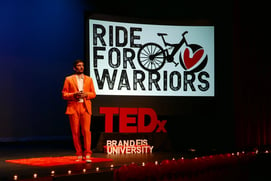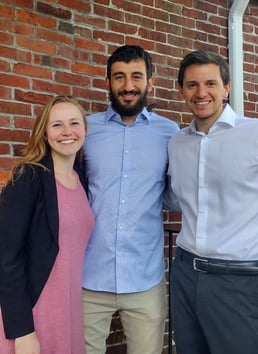About Us
Learn more about our mission, story, and team!
Our Mission
We believe that healthcare is a human right and high insulin prices are an unnecessary and restrictive burden on patients. That is why we are creating our own biosimilar (generic) insulin glargine. We will distribute our insulin directly to patients at cost through our mail-order pharmacy.
Our Team
Dedicated Minds, Compassionate Hearts: Our Core Team - Discover the individuals whose expertise, passion, and vision are the driving force behind Project Insulin's mission to make insulin affordable and accessible for everyone.
.png)
Eric Moyal
Executive Director
Before founding Project Insulin, Eric Moyal was a fundraiser at Brandeis University and helped coordinate the 2020 & 2021 Giving Tuesday Campaigns that raised over $2,000,000. Eric is on the Board of Directors and chair of the communications committee at Reflex Sympathetic Dystrophy Syndrome Association. He has spent the past three years raising money and awareness for Complex Regional Pain Syndrome, and gave a TEDx talk in 2020 about how to be a better ally to people with chronic illnesses.
.png)
Gabriella Fleischman
Board Member
Gabriella Fleischman is a Ph.D. student in Public Policy at the Harvard Kennedy School. Gabriella was diagnosed with type 1 diabetes at fourteen years old. In 2020, she started a blog about living with chronic health conditions with her sister, who also has type 1 diabetes. Her research is at the intersection of health and development economics, with a focus on equity and health behavior.
.png)
Emily Lynn
Board Member
Emily Lynn, MBA, MPH, has a background in healthcare management and is dedicated to helping health-focused organizations achieve their goals through good management and best business practices. Her current work focuses on improving patient access in ambulatory settings by leveraging technology to improve the scheduling experience for patients, providers, and staff.
Our Story
Eric and Gabriella had a conversation about the insulin market for the first time on World Diabetes Day on November 14, 2020. It is the birthday of Frederick Banting, the most prolific of the scientists who discovered insulin. Eric posted a supportive Instagram post, but wrote one small but crucial incorrect statement: he attributed the rising price of insulin to increases in insulin quality.
Gabriella explained how the price of insulin is rising because three companies dominate the market and they have no incentive to lower prices. Pharmaceutical companies use the fact that insulin is a biologic to patent new types of insulin and it is not cost-effective for them to make an affordable generic. Their already massive profits increase alongside the prices.
Eric took a moment to process this new information, then asked, “Then why doesn’t somebody just create a generic insulin, and undercut them?” Gabriella explained that creating insulin is very expensive.
As a person with type 1 diabetes, Gabriella dealt with expensive insulin for years. She was diagnosed as a teenager, so insulin expenses fit into her monthly bill the same as rent or utilities do: an annoying but necessary expenditure that could not be manipulated or negotiated easily. She never knew life without this expense, so the expense never stung too badly—until a trip in college when she was hours from home, had forgotten her insulin, and needed insulin immediately. Feeling a sense of missing-ness that can only be likened to knowing an internal organ has disappeared, she went to a pharmacy and paid out-of-pocket. As a student working a part-time minimum wage job, it was gut-wrenching to see hundreds of dollars—more than her monthly food budget—vanish due to the casual forgetfulness that causes all of us to occasionally leave behind our wallet or keys. More painful than paying the bill was the realization that she had no other alternative.
With the few companies dominating the market as decisively as they do, it would probably be hard to enter the market and make a profit. Eric replied, “Then why doesn’t a non-profit do it?”, to which Gabriella had no response other than that nobody had done it yet. About a month later, Eric read a story about a teenager with diabetes who had to ration insulin due to financial hardship, and that was the final motivating push he needed. He decided he was going to be the person to make a non-profit pharmaceutical company that would manufacture and distribute affordable insulin.
 He became an advocate and fundraiser for both conditions, using biking campaigns to raise $7,500 for people with CRPS between 2019 and 2021 (including a 1,700 mile ride from Boston to Miami).
He became an advocate and fundraiser for both conditions, using biking campaigns to raise $7,500 for people with CRPS between 2019 and 2021 (including a 1,700 mile ride from Boston to Miami).
The people he met who were living CRPS and TOS taught him about ally ship, including how much work it requires to be a true ally and how valuable it can be for people who feel isolated due to their chronic illnesses. He felt this lesson was so important that he gave a TEDx talk about ally ship at Brandeis University in 2020.
In 2020, Eric and Gabriella met. Within a month of their meeting, it was clear to Eric how difficult it is for a person with diabetes to maintain stable blood glucose levels. The first time he saw Gabriella go through a low blood glucose episode, Gabriella had to sit down on the sidewalk in the middle of a walk to take a breath and eat candy. Within a few minutes, Gabriella was able to resume the walk in good spirits. For Eric, the incident was a scary introduction to the daily life of someone who is insulin-dependent. He learned more about diabetes as he saw how blood sugar highs and lows affected Gabriella. Despite how central diabetes was to her life, they never talked about the price of insulin until World Diabetes Day in 2020.
At the time, Eric was feeling stagnant in his fundraising job at a non-profit. He wanted to help others by working in healthcare, but was frustrated because he felt like the ability to make any real change in the medical field required a scientific background. When he learned about the insulin market, he realized that he had found a place where he could make a difference: science was not the limiting factor for bringing an affordable biosimilar insulin to the market— money was.
 The inspiration for Project Insulin began to take form. Eric dove headfirst into academic papers to learn everything he could about insulin. He messaged everyone he knew who could possibly help, including Sam. They hadn’t spoken for a while and Sam was expecting to hear about his job, his apartment, and any other mundane new piece of his life. What he got was much different.
The inspiration for Project Insulin began to take form. Eric dove headfirst into academic papers to learn everything he could about insulin. He messaged everyone he knew who could possibly help, including Sam. They hadn’t spoken for a while and Sam was expecting to hear about his job, his apartment, and any other mundane new piece of his life. What he got was much different.
Eric told Sam about his desire to introduce biosimilar insulin to the marketplace so that insulin-insecure individuals could afford the life-saving drug. Sam was impressed by the mission and wanted to help get the company off the ground.
As an attorney, he has experience incorporating nonprofit organizations and guiding businesses through their life cycles. Pro bono legal assistance has always been an important part of his legal practice, and he saw Project Insulin as a way for him to help people who are less fortunate than him.
For Eric, Sam was the first person to believe that Project Insulin was something achievable. Every couple weeks for the following three months, Sam messaged Eric to find ways to help. Gabriella was always eager to lend her advice, perspective, and passionate rants. Eric, Gabriella, and Sam came together as the first board-members naturally, and met as the Board of Project Insulin for the first time in May 2021. Amidst that flurry of phone calls and late-night conversations, in the middle of a pandemic, Project Insulin was born.
We are working to disrupt a system which only works well for the college-educated, the insured, and the financially-secure, purposely leaving out the vast majority of uninsured, insulin-dependent Americans. Insulin should not be available only to those who are financially secure or insured. Healthcare is a human right.
